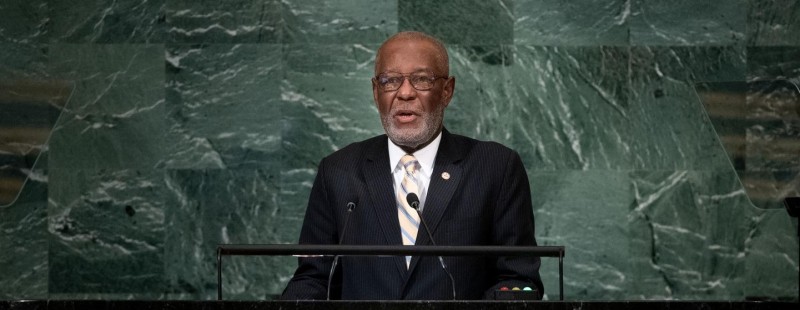Jean Victor Geneus, Minister for Foreign Affairs and Worship of the Republic of Haïti, addresses the general debate of the General Assembly’s seventy-seventh session. Escalating gang violence has set off a crisis that is threatening “the very foundations of the rule of law” in Haiti, according to Foreign Minister Jean Victor Geneus, who told UN delegates in New York on Saturday that the authorities’ efforts to maintain order and ease ongoing political tensions could only succeed with robust international support. “[We are] facing a multifaceted socio-political and economic crisis that is being exacerbated by insecurity,” said Mr. Geneus, telling the afternoon session of the General- Assembly’s annual high-level debate that he was delivering a statement on behalf of Haitian Prime Minister Ariel Henry, who decided to remain in the county due to the increasingly worrying situation there. As gang violence spreads and the political crisis deepens “Haiti finds itself at a crossroads that is difficult but decisive for its future…this dilemma can only be solved with the effective support of our partners,” he explained, adding that with the country’s democracy under threat, his first order of business would be to “restore security and public order without delay.” Next, he would seek to, as soon as possible, reach broad consensus on a political agreement among a maximum of sectors to achieve peaceful governance. The would be followed by efforts to create a climate conducive to the rapid holding of general elections to return power freely chosen by the Haitian people and restore democratic institutions; and putting measures in place to respond to economic and social issues. On the issue of security and restoring public order, he denounced the activities of the gangs, which have “created a detrimental climate that is poisoning the daily lives of the Haitian people.” Moreover, clashes among rival gangs had left a high number of casualties and forced many people to flee their homes to escape the terror of these outlaws.” As such, In his capacity as the head of the Supreme Council of National Police, Prime Minister Henry had taken measures to make the Force more efficient and better prepared to combat insecurity and gang activity, by strengthening operational capacities and improving the working conditions of. “The intensification of operations has achieved some good results, which has reduced abuses by armed gangs, particularly in the metropolitan areas. However, much remains to be done to end this scourge,” he said. In that context, he noted that some of these efforts were being hampered by the slow delivery of armored vehicles and equipment that the police force lacks. On the political front, he said that despite differences between the various actors, Prime Minister Henry continued to encourage dialogue. Initiatives involving various components of Haitian society are under way, including the restoration of fully operational democratic institutions through free, transparent and inclusive elections, as well as constitutional reform. He went on to say that while Haiti recognized that it is a constitutional right to peaceful demonstrations, it would nevertheless condemn the looting, acts of vandalism and attacks perpetrated against churches, schools, universities and hospitals, among others, during recent protests. Finally, in the words of Prime Minister Henry, he said: “Contrary to what some of my adversaries say, I have no desire to stay in power longer than necessary.” His main concern was the return to constitutional order and handing over management of the country’s affairs to elected officials freely chosen by the people. He therefore aspired to find a political agreement to organize presidential, legislative and local elections “as soon as conditions permit”.
Quickly restoring public order
Violent gangs ‘poisoning’ Haitian society
Elections ‘as soon as conditions permit’
Related Posts
WEJ PROJECTS
© 2009-2025, World Economic Journal. All Rights Reserved. Republishing permitted with attribution and active hyperlink to the original source.

